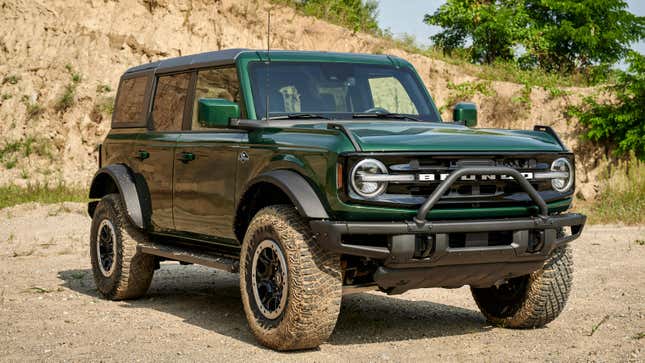
I just spent the weekend driving a soft-top 2022 Ford Bronco Sasquatch, and it’s making me rethink everything. Namely, everything I’ve always loved about the Jeep Wrangler.
See, the Bronco is the first drop-top 4x4 in a long time that offers independent front suspension. In part, that’s because it’s the first drop-top 4x4 in a long time that isn’t the Jeep Wrangler.
I love the Jeep Wrangler. I just plain love Jeeps. I’ve owned a few (some in truly disgusting condition), and while I can’t claim the all-in Jeep lifestyle of David Tracy (RIP), I’ve long held the opinion that your off-roader ain’t worth a damn unless it has a solid front axle.
My weekend with the Bronco has shone some light through the cracks in that particular line of thought.
See, even with hulking 35-inch off-road tires and a high-altitude suspension (all part of the Sasquatch package), the Bronco I drove was extremely sure-footed on highways, twisty back-roads, and choppy pavement. You definitely feel the weight of those big, wide 35s working against you in steering and braking, but compared to all the solid-axle rigs I’ve driven, it’s a whole different animal.
And I’m not just talking about the Wrangler. The old Mercedes G-Wagen had a solid front axle. That thing was, to put it kindly, a handful to drive, whether or not it was powered by some fire-breathing AMG engine with five times the horsepower of the engine the vehicle was originally engineered to use. The Wrangler is the obvious target with Ford’s new Bronco, and it’s astounding how any domestic automaker let Jeep have total, uncontested ownership of the no-roof, no-doors off-road segment for basically my entire lifetime. But while Jeep has made a tradition of using a solid front axle in the Wrangler, it’s not the only automaker that carried that reliable ancient configuration into the 21st century.
I have a particularly gnarly off-ramp on my usual weekend jaunt that always draws out the weaknesses in a solid-front-axle vehicle. It’s a downhill 270-degree curve with a bunch of cracks and bumps that run across the ramp roughly perpendicular to traffic. A bumpy curve can make even a brand-new, zero-mile Wrangler feel a little skittish. In my dearly departed ‘92 XJ Cherokee, the whole rig would shimmy and shake as I descended the ramp, the notorious “death wobble” on full display.
I took that notorious ramp yesterday evening in the Bronco. Roof down, windows down, sunset pouring across the horizon and some choice jams playing. Long story short, my brain was in Wrangler mode, and I hit the curve anticipating lots of shimmy and protest through the steering wheel.
Nada. Nothing. The Bronco ate up that ramp like it was as smooth as a bowling lane.
On the one hand, it’s no surprise. Independent suspension was invented to get rid of the bad behavior of solid axles, and we’ve known for a century that it’s the superior layout. In recent years, even the most hardcore off-road vehicles have made the switch to IFS. Culturally speaking, the Mercedes G-Wagen is a rich-person show-off purchase, but Mercedes knew the modern-day vehicle had to perform off-road just as convincingly as the previous generation, and the company made good on that promise. Every serious off-road machine from GM, Ford, and Ram uses independent front suspension, and — excepting the tradition-bound Wrangler and Gladiator — every modern Jeep has independent suspension front and rear.
I’m not sure I’m ready to renounce the solid front axle entirely. Jeep has stuck with that configuration since WWII for good reasons, and tradition is only part of the story. But my weekend with the big Bronco made me understand that a capable, joyful open-top 4x4 doesn’t have to shiver and shimmy every time you ask it to think in two directions at once.
Having committed three decades to the religion of the solid front axle, I’m beginning to experience some doubts.